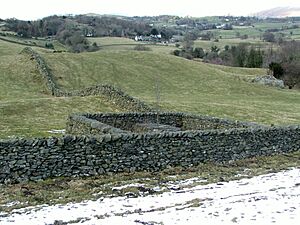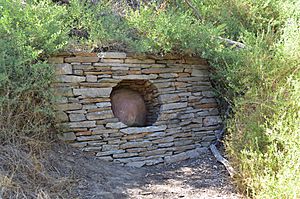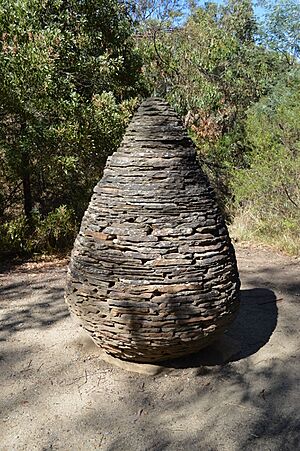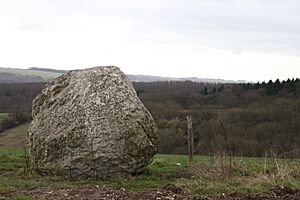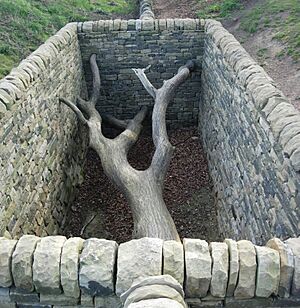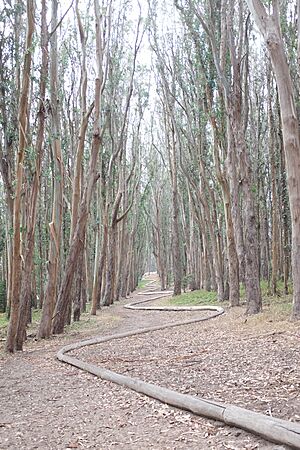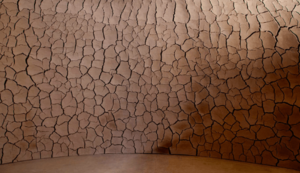Andy Goldsworthy facts for kids
Quick facts for kids
Andy Goldsworthy
|
|
|---|---|
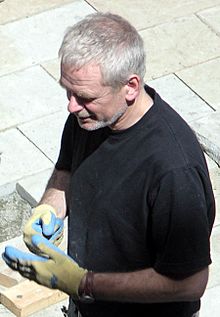
Goldsworthy in 2005
|
|
| Born | 25 July 1956 Cheshire, England
|
| Known for | Sculpture, photography |
| Movement | Environmental art, land art |
| Spouse(s) | Judith Gregson (divorced) |
| Partner(s) | Tina Fiske |
Andy Goldsworthy is a famous English artist, photographer, and environmentalist. He creates unique sculptures and art pieces using natural materials found in outdoor places. His art is often called "land art" because it's made directly in nature or in city settings.
Contents
Early Life and Farm Work
Andy Goldsworthy was born in Cheshire, England, on July 25, 1956. He grew up near Leeds. From the age of 13, he started working on farms. He felt that the repeated tasks on a farm, like picking potatoes, were similar to the rhythm he found in making his art.
He studied art at Bradford College of Art and later at Preston Polytechnic (now the University of Central Lancashire).
Andy Goldsworthy's Art Journey
Moving Around and Making Art
After finishing college, Andy Goldsworthy lived in different parts of England, including Yorkshire and Cumbria. In 1985, he moved to Scotland and settled in a village called Penpont, where he still lives today. He moved north to find new places to work and for practical reasons.
In 2003, Andy Goldsworthy created a special artwork for the de Young Museum in San Francisco. It was called "Drawn Stone." This piece showed a giant crack in the ground that split into smaller cracks, like the effects of an earthquake. He used a hammer to make the smaller cracks, which meant each one was a surprise.
How Andy Goldsworthy Creates Art
Andy Goldsworthy uses many different natural materials for his art. These include colorful flowers, shiny icicles, fallen leaves, mud, pinecones, snow, stones, twigs, and thorns. He believes it's important to work with all parts of nature, even delicate things like flower petals.
His art doesn't try to change nature too much. Instead, he gently arranges materials to show off natural processes. He prefers to work with loose stones and pebbles rather than breaking off pieces of solid rock. This way, his art feels like it's part of nature's journey.
Many of Goldsworthy's artworks are small and don't last forever. For these temporary pieces, he often uses only his hands, teeth, or simple tools he finds nearby. This shows how much he focuses on time and how things naturally change and decay. This is different from some other land artists who make huge, permanent structures.
For his bigger, lasting sculptures, like "Roof" or "Stone River," he sometimes uses machines. For example, to build "Roof," he worked with skilled stone wall builders to make sure the structure was strong and would last.
Andy Goldsworthy is also known for being a pioneer in modern rock balancing, which is the art of stacking stones without any glue or support.
The Role of Photography in His Art
Because many of Andy Goldsworthy's artworks are temporary and will eventually disappear, photography is very important. He takes pictures of his art, usually himself, to capture them at their best moment. These photos allow people to see his work even after it has naturally changed or decayed.
He says that photography helps him understand his own art better. It's like a way for him to "talk, write, and think" about his creations. The photos show how his art connects and develops over time.
Personal Life
Andy Goldsworthy married Judith Gregson in 1982, and they had four children. They later separated. He now lives in Penpont, Scotland, with his partner, Tina Fiske, who studies art history.
Awards and Recognition
Andy Goldsworthy has received many awards for his art, including:
- 1979 – North West Arts Award
- 1980 – Yorkshire Arts Award
- 1981 – Northern Arts Award
- 1982 – Northern Arts Award
- 1986 – Northern Arts Bursary
- 1987 – Scottish Arts Council Award
- 1989 – Northern Electricity Arts Award
- 2000 – Appointed Officer of the Order of the British Empire (OBE)
Exhibitions and Installations
Andy Goldsworthy's art has been shown in many places around the world. Here are some of his notable exhibitions and permanent installations:
| Image | Dates | Title | Location |
|---|---|---|---|
| 1995–2008 | Sapsucker Cairn | Ithaca, New York, USA | |
| 1996–2003 | Sheepfolds | Cumbria, England, UK | |
| 1997 | Stone House | Herring Island, Victoria, Australia | |
| 1997 | Cairn | Herring Island, Victoria, Australia | |
| 1998 | Hutton Roof | National Museum of Scotland Edinburgh, Scotland, UK |
|
| 22 May – 15 November 2000 |
Andy Goldsworthy at Storm King Art Center (featuring the installation Storm King Wall) |
Storm King Art Center Mountainville, Cornwall, New York, USA |
|
| August 2001 | Stone River | Cantor Arts Center, Stanford University Stanford, California, USA |
|
| 2002 | Andy Goldsworthy Arch at Goodwood | Cass Sculpture Foundation Goodwood, West Sussex, England, UK |
|
| 2002 | Chalk Stones Trail | South Downs near West Dean, West Sussex | |
| 2002 | Three Cairns | Des Moines Art Center Des Moines, IA USA |
|
| 4 May – 31 October 2004 |
Andy Goldsworthy on the Roof
(featuring the installation Stone Houses) |
Iris and B. Gerald Cantor Metropolitan Museum of Art Roof Garden New York City, USA |
|
| 2005 | Andy Goldsworthy: Early Works A national touring exhibition from the Haywood Gallery |
England, United Kingdom | |
| 2005 | Drawn Stone | M. H. de Young Memorial Museum San Francisco |
|
| 2005 | Arches | Gibbs Farm New Zealand |
|
| 22 January – 15 May 2005 |
The Andy Goldsworthy Project (including the installation Roof) |
National Gallery of Art National Mall, Washington, D.C., USA |
|
| 2006 | Red sandstone wall at the Doerr-Hosier Center | Aspen Institute Aspen, Colorado, USA |
|
| 31 March 2007 – 6 January 2008 |
Hanging Trees | Yorkshire Sculpture Park West Bretton, Wakefield, West Yorkshire, England, UK |
|
| 2007 – 2008 | Clay Houses (Boulder-Room-Holes) | Glenstone Potomac, Maryland, USA |
|
| October 2008 | Spire | Park Presidio San Francisco |
|
| June 2009 | Refuge d'Art Hiking Trail, Provence, France | Provence France |
|
| 2010-11 | Wood Line | Park Presidio San Francisco |
|
| 7 September 2012 – 2 November 2012 |
Domo de Argila / Clay Dome | Cais do Porto Rio de Janeiro, Brazil |
|
| 2013 | Tree Fall | Park Presidio San Francisco |
|
| 2014 | Earth Wall | Park Presidio San Francisco |
|
| 2019 | Walking Wall | Nelson-Atkins Museum of Art Missouri |
Films About Andy Goldsworthy
Two documentary films have been made about Andy Goldsworthy and his art by German director Thomas Riedelsheimer:
- Rivers and Tides (released in 2001)
- Leaning into the Wind (released in 2017)
See also
 In Spanish: Andy Goldsworthy para niños
In Spanish: Andy Goldsworthy para niños
- Environmental art
- Land art
- Rock balancing
Further Information
Articles:
- SPARK Educator Guide . Andy Goldsworthy at the de Young Museum in San Francisco. (Visual Arts: earthworks). (2005).
Films:
- Rivers and Tides (2001) documentary by Thomas Riedelsheimer
- Leaning into the Wind (2017) documentary by Thomas Riedelsheimer ()
 | Shirley Ann Jackson |
 | Garett Morgan |
 | J. Ernest Wilkins Jr. |
 | Elijah McCoy |


